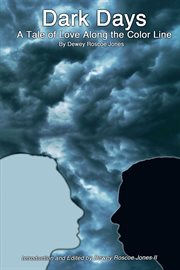Fiction
eBook
Details
PUBLISHED
Made available through hoopla
DESCRIPTION
1 online resource
ISBN/ISSN
LANGUAGE
NOTES
Dewey Roscoe Jones was a pioneering African American journalist. While working for the Chicago Defender, the most widely read black newspaper in the United States, he edited a book review column and a poetry column whose contributors included Langston Hughes, Countee Cullen, Frank Marshall Davis, and Gwendolyn Brooks. Jones personally wrote about fifty reviews, becoming Black Chicagos premier literary critic and commentator on the Harlem Renaissance. Frequently disappointed by the novels emanating from New York, he endeavored to create his own masterwork of fiction. Dark Days is the fruit of his labors. Ishmael, the novels protagonist, comes to age in Oklahoma, a wild territory where former slaves and their offspring vie with former plantation owners and their offspring to make a new life. Theirs is a common legacy of frontier violence and frontier dreams, born in the aftermath of the Civil War, forcible removal of Native Americans, and the 1889 Land Rush. Black Ishmael loves white Denise, and their interlocked fates are the center of the tale. Ishmaels turbulent journey follows Joness own path from Muskogee to Chicago to the trenches of war-torn France. Dark Days was completed midway between 1930 publication of Langston Hughess novel Not Without Laughter and Richard Wrights Native Son in 1940. That chronology situates it in the closing days of Harlems Renaissance and on the cusp of Black Chicagos creative flowering. By recovering his fathers novel, Dewey Roscoe Jones II has performed a service to all readers interested in the trajectory of African American creative expression in the early twentieth century. Richard A. Courage, Professor of English, Westchester Community College/SUNY; co-author of The Muse in Bronzeville: African American Creative Expression in Chicago, 1932-1950
Mode of access: World Wide Web







